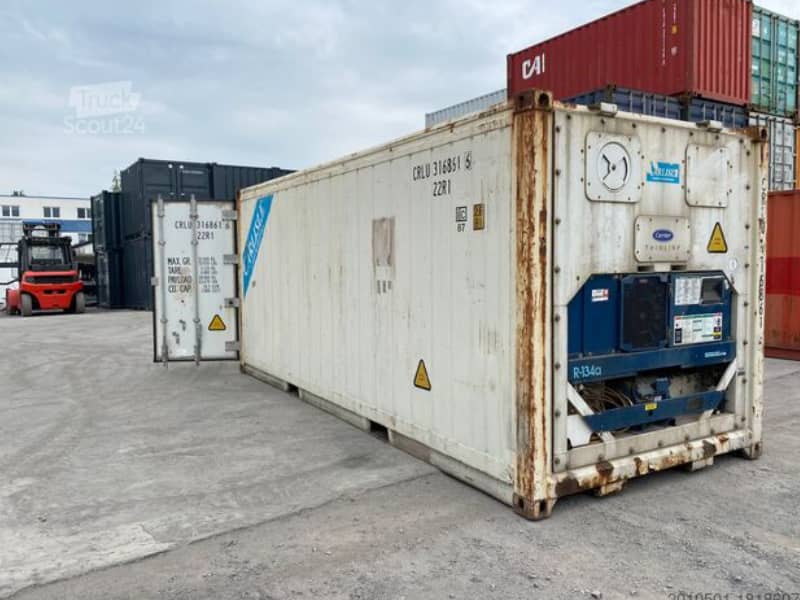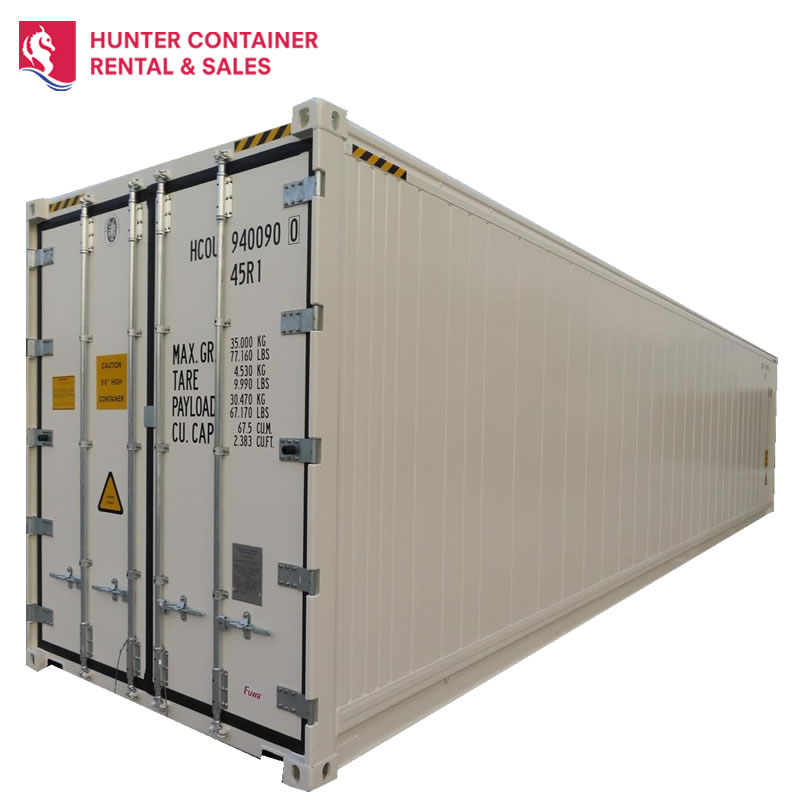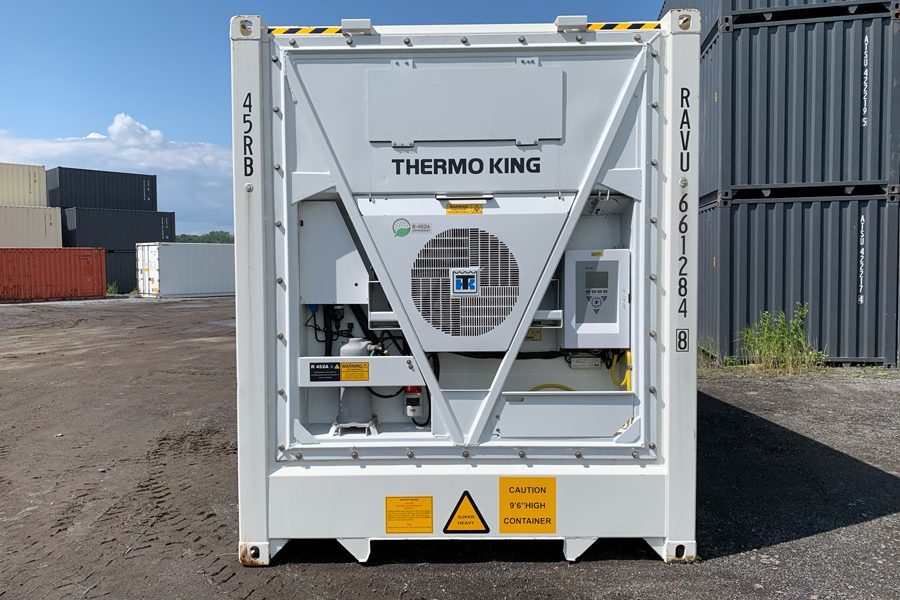All About Cold Storage Containers: Necessary Insights for Your Storage Demands
Freezer containers play a vital role in the conservation of disposable goods. They can be found in different types, consisting of refrigerated and insulated systems, each created for particular storage needs. Understanding the advantages and crucial functions of these containers is necessary for businesses intending to optimize their operations. As the demand for efficient storage space services grows, checking out the various alternatives readily available can lead to educated decisions that impact both success and sustainability. What elements should one take into consideration when picking the right container?
Types of Freezer Containers
Cold store containers come in numerous types, each developed to meet details temperature level control requirements. Among the most typical types are cooled containers, which preserve temperature levels between 0 ° C to 10 ° C, making them ideal for subject to spoiling goods like fruits, veggies, and dairy items. An additional kind is the deep freezer container, which operates at temperatures listed below -18 ° C, suitable for long-term storage space of frozen items such as meats and fish and shellfish.
Shielded containers offer temperature level stability without energetic cooling, making them helpful for short-term transport of temperature-sensitive items. Furthermore, there are mobile freezer devices, which use flexibility in places and are typically made use of in events or seasonal procedures. Blast chillers swiftly reduce the temperature of hot foods, making sure security and quality. Each type serves an one-of-a-kind function in numerous markets, from food solution to drugs, emphasizing the value of choosing the appropriate container for certain storage requirements.

Advantages of Making Use Of Cold Storage Solutions

Furthermore, cool storage remedies expand the rack life of things, reducing waste and enhancing earnings for companies. By effectively taking care of inventory with appropriate temperature level control, firms can enhance their supply chains and boost functional efficiency.
Additionally, cold store centers permit versatile storage choices, accommodating various volume requirements and seasonal variations sought after (used 40ft refrigerated shipping containers). This adaptability aids services react promptly to market adjustments
Using cool storage solutions can ensure conformity with wellness and safety guidelines, protecting both companies and customers. On the whole, the strategic usage of cold store improves item monitoring while advertising sustainability and economic feasibility.
Key Features to Try To Find in Freezer Containers
When choosing freezer containers, numerous vital functions quality cautious factor to consider to protect peak performance and reliability. First, temperature level control capacities are vital; containers ought to preserve consistent temperature levels appropriate for certain goods. Insulation quality likewise plays a considerable role, as remarkable insulation reduces energy consumption and improves temperature level stability.
Next off, simplicity of accessibility and loading is essential; containers should provide straightforward designs for efficient handling and organization. Sturdiness is one more important aspect; weather-resistant products guarantee durability and secure materials against environmental elements.
In addition, movement features, such as integrated wheels or raising factors, assist in transport, while adjustable designs allow for customized storage services.
Finally, monitoring systems, including temperature level alarm systems and remote monitoring, offer real-time updates, ensuring that problems continue to be excellent. By concentrating on these functions, users can pick freezer containers that satisfy their functional needs successfully.
Selecting the Right Freezer Container for Your Requirements
Choosing the ideal cold store container calls for a thoughtful evaluation of operational needs and details requirements. Variables such as the kind of products being stored, temperature sensitivity, and volume must be prioritized. As an example, disposable food items may require containers with rigid temperature level controls, while pharmaceuticals may call for exact problems to keep efficacy.
Additionally, prospective individuals need to consider the container's dimension and movement. A larger device may be essential for mass storage space, while smaller sized, portable choices can be perfect for momentary or on-site needs. Insulation top quality and power performance are also important, as these will influence operational costs and temperature stability.
Conformity with sector laws and requirements is essential, especially in industries like food and medical care. By meticulously reviewing these elements, individuals can pick a cold storage space container that effectively fulfills their distinct needs and warranties optimum storage conditions.
Finest Practices for Maintaining Cold Storage Space Conditions
Maintaining ideal cold store conditions is essential for protecting the high quality and security of temperature-sensitive items. Frequently keeping an eye on temperature and moisture levels is vital; making use of reputable electronic thermostats and hygrometers can give precise readings. Proper insulation of cool storage containers assists decrease temperature variations and energy loss.
Applying a first-in, first-out (FIFO) system assures that older supply is made use of prior to newer supply, lowering waste (used 40ft refrigerated shipping containers). Additionally, preserving an arranged design within the storage room permits better air flow and reduces the danger of cross-contamination
Regular upkeep checks on equipment, such as seals and compressors, are very important to avoid breakdowns. Team training on best practices for filling and discharging products assists keep temperature stability. Keeping doors shut as much as possible limitations heat exchange, assuring that the chilly storage space environment remains efficient and stable in maintaining important products.
Price Factors To Consider for Cold Storage Solutions
When examining cool storage solutions, it is vital to take right into account the first investment expenses together with continuous operational costs. A detailed break down of these expenses can disclose significant lasting savings possibility for services. Comprehending these economic facets assists stakeholders make informed decisions regarding their cool storage space demands.

First Investment Costs
The used 40ft cold storage containers for sale economic landscape of cold storage containers offers various initial investment prices that organizations must consider. These costs normally include the purchase or rental rate of the containers, which can vary based on insulation, size, and type high quality. In addition, expenses related to retrofitting existing frameworks to fit cool storage should be factored in, specifically if specialized equipment is needed. Installment expenses, consisting of electrical work and refrigeration systems, likewise add to the total initial investment. Companies ought to not neglect transportation prices for supplying containers to their desired location. Finally, potential modification alternatives, such as shelving or temperature monitoring systems, can better affect the first monetary investment. Careful budgeting for these factors is essential for effective cold store execution.
Functional Expenditures Malfunction
Operational expenditures for freezer solutions incorporate numerous vital price factors to consider that organizations should navigate. Key variables include power prices, which can be considerable as a result of the requirement to preserve reduced temperature levels. Maintenance costs are additionally significant, as routine maintenance is important to ensure tools runs successfully and remains compliant with wellness and safety standards. Furthermore, labor prices may emerge from the requirement for specialized staff to keep track of the storage and take care of atmosphere. Insurance expenses are one more consideration, as business have to protect their financial investments against potential losses. Any kind of prospective regulatory conformity costs should be factored in, as businesses may require to invest in systems that adhere to food security and environmental laws. Understanding these expenditures is crucial for effective budgeting.
Long-Term Savings Possible
Investing in freezer services supplies significant lasting savings possibility, changing first expenses right into financial performance in time. By lessening spoilage and waste, businesses can enhance their profit margins substantially. Advanced insulation and energy-efficient systems reduce energy prices, which gather over the life expectancy of the tools. Additionally, cold store containers typically need much less regular maintenance compared to conventional refrigeration approaches, leading to lower repair expenditures. The capability to store products for extended periods without endangering quality allows organizations to profit from market changes, enhancing income. In addition, the scalability of chilly storage space options enables firms to adjust to altering needs without sustaining excessive costs. In general, these variables add to an engaging situation for freezer as a cost-efficient financial investment technique.
Regularly Asked Questions
The Length Of Time Can Food Be Kept in Freezer Containers?
The period food can be kept in freezer containers differs by kind. Typically, perishable items last from days to weeks, while frozen foods can stay risk-free for months, depending upon correct temperature level and storage space conditions.
Are Freezer Containers Energy-saving?
The energy performance of chilly storage containers differs based upon layout and insulation high quality. Modern units often utilize innovative modern technology to minimize power intake, inevitably adding to reduced operational prices and ecological effect in long-lasting usage.
Can Cold Storage Space Containers Be Custom-made for Particular Needs?
Freezer containers can undoubtedly be personalized to satisfy certain demands. Alterations might include temperature level controls, size changes, and additional attributes, permitting users to customize solutions efficiently for numerous storage space needs and operational choices.
What Are the Usual Sizes of Cold Store Containers?
Cold store containers generally can be found in typical dimensions such as 10, 20, and 40 feet. These dimensions suit various storage requirements, ensuring versatility for companies requiring temperature-controlled environments for disposable items or sensitive materials.
Do Freezer Containers Require Unique Licenses for Use?
Cold store containers typically need special authorizations for usage, depending upon local guidelines and meant applications. Authorities may mandate authorizations to assure safety and security criteria, environmental compliance, and correct operational techniques are maintained during their use.
Cold storage containers come in numerous types, each made to meet details temperature level control needs. Furthermore, cold storage space facilities permit for flexible storage choices, accommodating various quantity requirements and seasonal variations in need. Choosing the best cold storage container requires a thoughtful assessment of functional requirements and particular needs. The financial landscape of cool storage space containers offers various first investment costs that services have to consider. Cold storage space containers can without a doubt be customized to satisfy certain requirements.